The winner in the category of Curriculum Innovation was Lyne Tardif, Service aux Élèves, Centre de Service Scolaire de Montréal. Tardif founded a program called Un Boîte au Ciel, which developed classroom partnerships between special needs students and engineering students specializing in space technology. Her husband and son were on hand to accept the award on her behalf. Diane Querrien provided a response to Tardif’s work, discussing its educational implications.
notice
CSLP Hosts First Pedagogical Innovation Awards
On May 4, 2023, the CSLP hosted the inaugural Pedagogical Innovation Awards in their research-creation space. Two teachers were awarded $1000 cash prizes for their innovative practices and presented with award certificates by CSLP co-Director David Waddington. Educational researchers from the CSLP were on hand to discuss the award-winning projects and a reception followed.
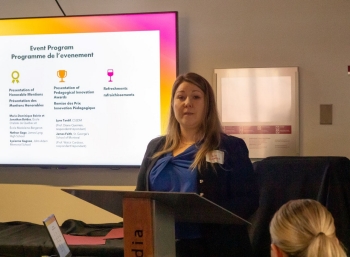 Diane Querrien responds to the work of Lyne Tardif. Photo by Shin Ling Low.
Diane Querrien responds to the work of Lyne Tardif. Photo by Shin Ling Low.
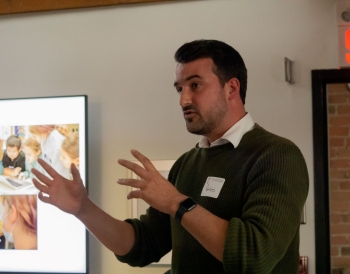 James Feith presents his project, which had grade 5 students create a videogame as part of their French language instruction. Photo by Shin Ling Low.
James Feith presents his project, which had grade 5 students create a videogame as part of their French language instruction. Photo by Shin Ling Low.
The winner in the category of Technological Innovation was James Feith, St. George's School of Montreal. Feith developed a new initiative, Storytelling and Video Game Design, that teaches high school students French through the design of a computer-based role-playing game. Feith was on hand to accept his award and to present his work. The respondent for his talk was Walcir Cardoso.
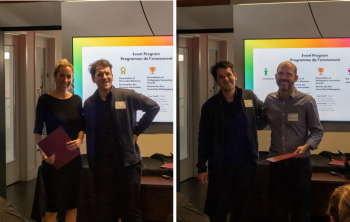 Honorable Mentions Marie-Dominique Boivin and Nathan Gage receive their certificates from CSLP co-Director David Waddington. Photos by Shin Ling Low.
Honorable Mentions Marie-Dominique Boivin and Nathan Gage receive their certificates from CSLP co-Director David Waddington. Photos by Shin Ling Low.
Several Honorary Mention certificates were also handed out:
Marie-Dominique Boivin and Jonathan Bolduc were honored for their work with students who have special needs at, respectively, the Ecole Oraliste du Quebec and Ecole Madeleine Gagnon. Boivin and Bolduc developed a program called Leaping Ahead: Connecting through Words and Sounds. In this program, they used an pioneering piece of equipment called Frogtouch, a revolutionary learning and therapy tool which allows students to play music without an instrument—simply by touching the skin. The program has been a great success with students, and is very popular with parents as well.
Lysianne Dupont was recognized for a series of family reading workshops for four-year olds and their families that she developed at the John Adam Memorial School. The goal of these workshops was both to offer early detection of potential issues to the families, as well as to introduce families to the support personnel who would be working with their children in the coming years.
Nathan Gage, a music teacher at James Lyng High School, looked for new innovative ways to teach his students to read music; using a new piece of software called GoPlayAlong Cloud, Gage developed a series of practices that allowed his students to learn to read music much more quickly and successfully than before. This technology has been popular with all his students, especially those on the autism spectrum, and it is part of a set of new music technologies that Gage has been using to great success at James Lyng.
A reception was held after the presentations that provided an opportunity for the award winners, their families, and CSLP researchers and students to discuss the work being done. Organizer and award presenter David Waddington was pleased with how the awards worked out, noting "I was delighted that we were able to give some formal appreciation and recognition to several excellent teachers from across Quebec. It was also wonderful to see researchers and practitioners talking to each other, and I hope that we can continue to use the resources of our Centre to help make these kinds of connections."
Le CEAP organise les premiers Prix de l'innovation pédagogique
Le 4 mai 2023, le CEAP a organisé les premiers Prix de l'innovation pédagogique dans son espace de recherche-création. Deux pédagogues ont reçu des prix de 1 000 $ pour leurs pratiques innovantes. Des chercheur.euses en éducation étaient présents pour discuter des projets primés et une réception a suivi.
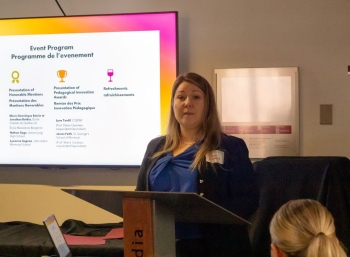 Diane Querrien réagit au travail de Lyne Tardif. Photo par Shin Ling Low.
Diane Querrien réagit au travail de Lyne Tardif. Photo par Shin Ling Low.
La lauréate dans la catégorie Innovation curriculaire est Lyne Tardif, Service aux Élèves, Centre de Service Scolaire de Montréal. Mme Tardif a fondé un programme appelé Un Boîte au Ciel, qui a permis de créer des partenariats en classe entre des élèves ayant des besoins spéciaux et des étudiant.es en ingénierie spécialisés dans la technologie spatiale. Son mari et son fils étaient présents pour accepter le prix en son nom. Diane Querrien était la répondante de de Mme Tardif en discutant de ses implications pédagogiques.
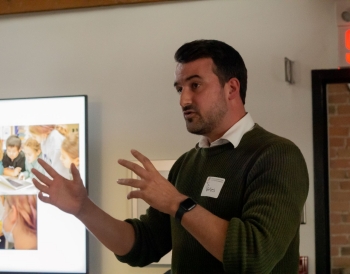 James Feith présente son projet, dans le cadre duquel des élèves de cinquième année ont créé un jeu vidéo dans le cadre de l'enseignement du français. Photo par Shin Ling Low.
James Feith présente son projet, dans le cadre duquel des élèves de cinquième année ont créé un jeu vidéo dans le cadre de l'enseignement du français. Photo par Shin Ling Low.
Le lauréat de la catégorie Innovation technologique est James Feith, de l'école St-George de Montréal. M. Feith a développé une nouvelle initiative, Storytelling and Video Game Design, qui enseigne le français aux élèves du secondaire par le biais de la conception d'un jeu de rôle informatisé. M. Feith était présent pour recevoir son prix et présenter son travail. L'invité pour son discours était Walcir Cardoso.
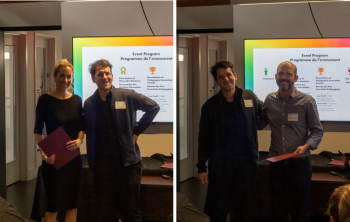 Mentions honorables Marie-Dominique Boivin et Nathan Gage reçoivent leur certificat des mains du codirecteur du CEAP, David Waddington. Photos par Shin Ling Low.
Mentions honorables Marie-Dominique Boivin et Nathan Gage reçoivent leur certificat des mains du codirecteur du CEAP, David Waddington. Photos par Shin Ling Low.
Plusieurs certificats de mention d'honneur ont également été remis :
Marie-Dominique Boivin et Jonathan Bolduc ont été récompensés pour leur travail auprès d'élèves ayant des besoins particuliers, respectivement à l'Ecole Oraliste du Québec et à l'Ecole Madeleine Gagnon. Boivin et Bolduc ont mis au point un programme intitulé Leaping Ahead : Connecting through Words and Sounds. Dans le cadre de ce programme, ils ont utilisé un équipement novateur appelé Frogtouch, un outil d'apprentissage et de thérapie révolutionnaire qui permet aux élèves de jouer de la musique sans instrument, simplement en touchant la peau. Le programme a connu un grand succès auprès des élèves et est également très populaire auprès des parents.
Lysianne Dupont a été récompensée pour une série d'ateliers de lecture en famille destinés aux enfants de quatre ans et à leurs familles qu'elle a mis en place à la John Adam Memorial School. L'objectif de ces ateliers était à la fois d'offrir aux familles une détection précoce des problèmes potentiels et de leur présenter le personnel de soutien qui travaillera avec leurs enfants dans les années à venir.
Nathan Gage, professeur de musique à la James Lyng High School, a cherché de nouvelles méthodes innovantes pour apprendre à ses élèves à lire la musique. En utilisant un nouveau logiciel appelé GoPlayAlong Cloud, Gage a développé une série de pratiques qui ont permis à ses élèves d'apprendre à lire la musique beaucoup plus rapidement et avec plus de succès qu'auparavant. Cette technologie a été très appréciée par tous ses élèves, en particulier ceux qui sont atteints d'autisme, et elle fait partie d'un ensemble de nouvelles technologies musicales que Gage utilise avec beaucoup de succès à James Lyng.
Après les présentations, une réception a permis aux lauréat.es, à leurs familles, ainsi qu'aux chercheur.euses et aux étudiant.es du CEAP de discuter des travaux en cours. David Waddington, organisateur et présentateur des prix, s'est dit satisfait du déroulement de la cérémonie : "Je suis ravi que nous ayons pu exprimer officiellement notre appréciation et notre reconnaissance à plusieurs excellents enseignant.es de tout le Québec. J'espère que nous pourrons continuer à utiliser les ressources de notre Centre pour établir ce type de liens."
